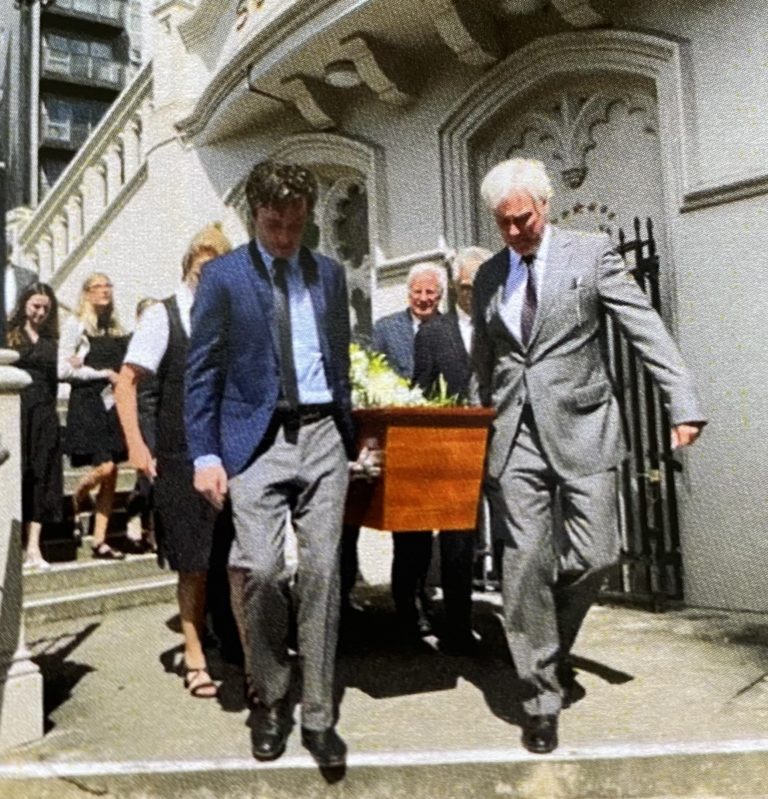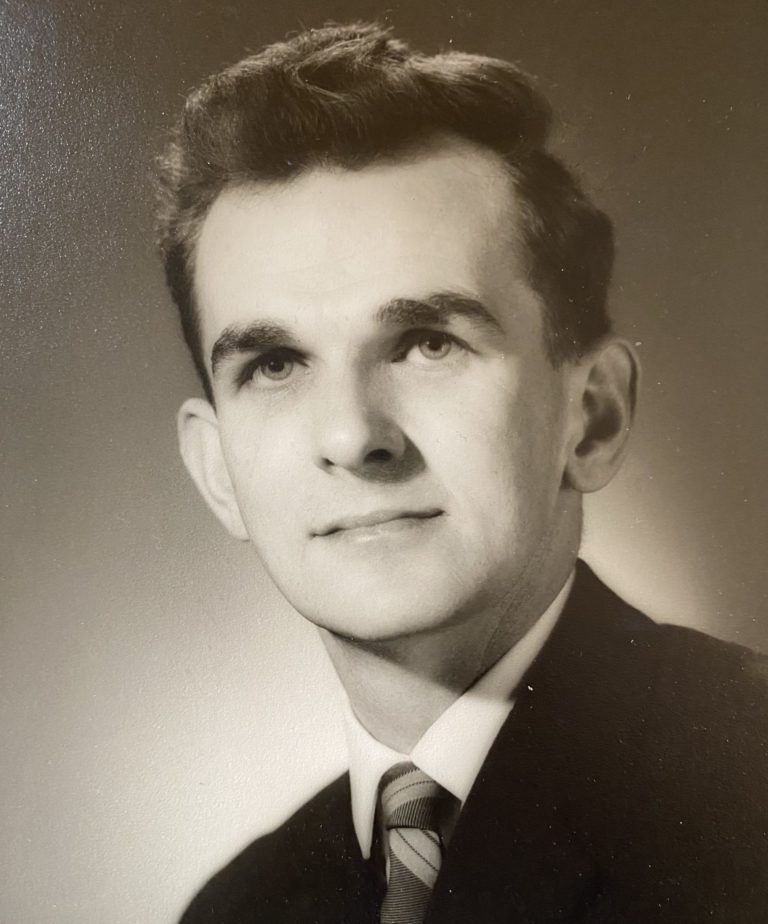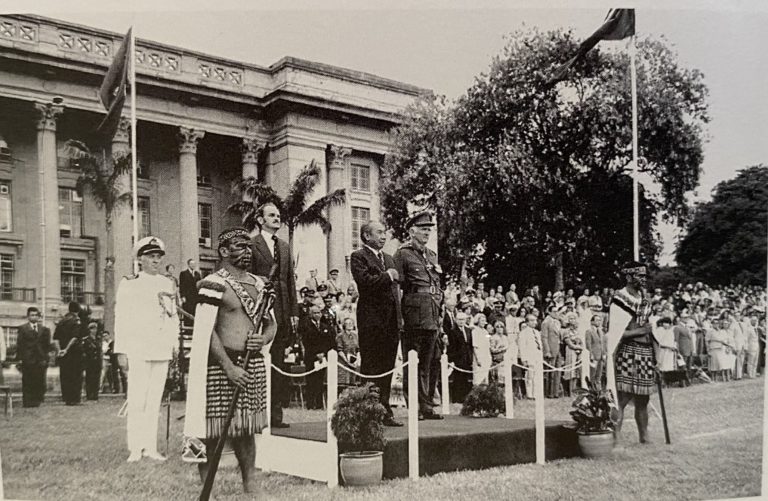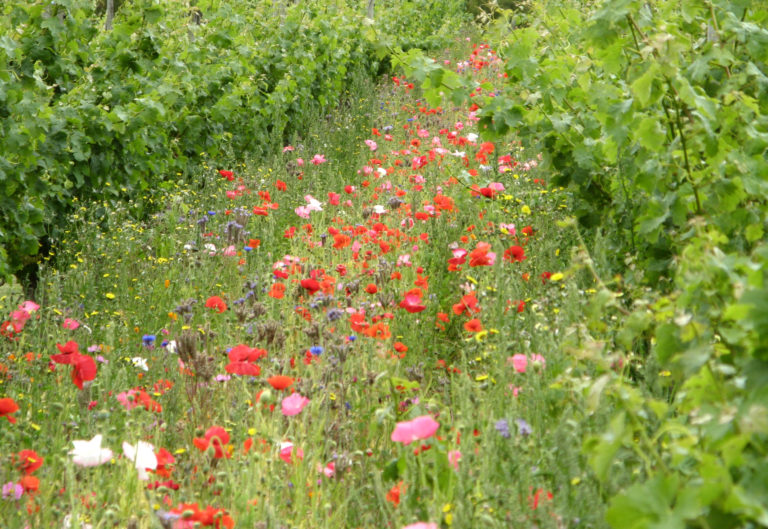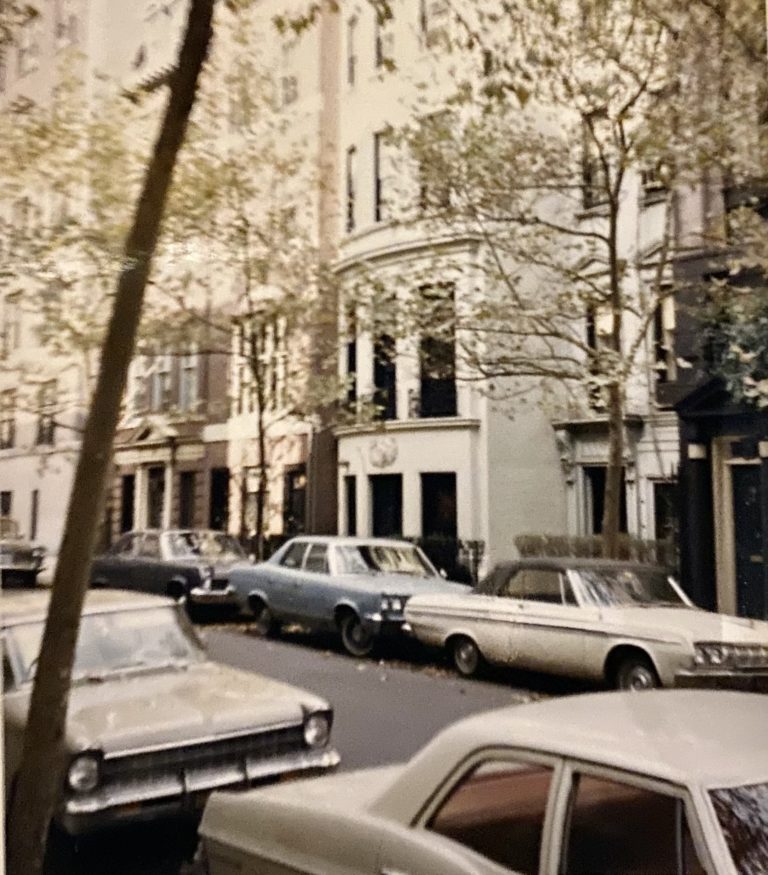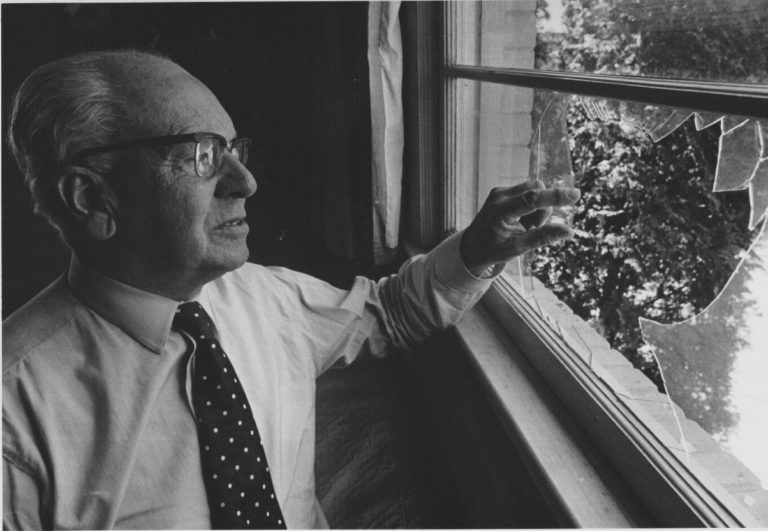Early Childhood
“We look at the world once, in childhood,/The rest is memory” Louise Gluck
I was born in a nursing home on Bealey Avenue (“Nurse Dev’s”) a few houses along from the nursing home where Julie was born almost two years later. The doctor who delivered me was Leslie Averill who in later years liked to describe himself as my oldest friend. He was a hero of the First World War, if an unlikely one, with a still green reputation as having captured the walled town of Le Quesnoy in the last days of that war. His memoirs do not do the occasion justice; like those of many men they are correct without a spark of excitement. His conversational account was much more vivid.
He was a young second-lieutenant when his platoon was ordered to scale the town walls. A nearby orchard ladder had been left beside the wall. He drew his revolver, shouted “Follow me” and ran up the ladder. On top of the wall he had a nasty shock. No-one had followed him and a file of German soldiers looked as if they were marching along the wall towards him. He told me, “I have never felt so lonely in my life”. Fortunately, the rest of his platoon then joined him, the German soldiers disappeared and the garrison surrendered. Every year this day is commemorated by the town whose notables, including the New Zealand ambassador, march along the Rue Averill to do so.
The first years of my life were as uneventful as the start. My first memory seems to have been when I was aged twenty months. I have a clear snapshot in my mind of being placed early one afternoon, hot and uncomfortable, in my cot beside the window and my father pulling up the side. I recall the little, laced-edged pillow under my head and the sun making a row of tiny pin-points of light in the stitching on the blind which had been pulled down. My parents could date this by the fact that I had whooping cough at that age (alleged to have triggered my lifelong asthma) and the cot and pillow were not in use much longer.
War had just broken out by the time I was four and had more connected memories. Some of the first are of the holiday we had at Christmas 1939 on a farm at Hapuku, north of Kaikoura. The farm was run by a kindly, grey-haired woman, Mrs McSaveney, with the help of a towering young Norwegian, Olaf. A bedroom at one end of the verandah of the old farmhouse was also the local post office and on occasions Mrs McSav, as she was universally known, would retire there, hang out a notice that said ‘Open”, and sit in state waiting for customers. It was an isolated place and I never saw any but there must have been some because Mrs McSav appealed to my father for help with her accounts which were in such a tangle that it took him a morning to straighten them out.
My first night was spent in a white canvas tent but the weather turned wet and gusty and I was bundled up by Olaf and carried sleepily into the lamplit kitchen, as warm and welcoming as the old wicker armchair I was laid in. The kitchen was large and the life of the farm was mainly lived there. There was a coal range along one side which was always burning, with a blackened kettle at the back from which anyone coming in could make themselves a cup of tea. There were dampers in the chimney which could cause a startling roar and when porridge was made in the morning one of the round covers would be lifted up to reveal a hellish flash of hot red flame. Electricity had not yet arrived and all meals were cooked on the range and the house was lit by kerosene lamps. When I slept upstairs I was escorted by a grownup with a candle in one of those white enamel chamber-sticks which seemed to belong to Wee Willie Winkie.
Olaf often carried me around on his shoulders and the view from up there was impressive. He hoisted me up on Christmas Day to see the two inter-island ferries pass each other out to sea, sailing in daylight because of the submarine threat. From there, on another occasion, I watched a nor-west gale tear away the roof of an old building on the paddocks that led down to the coast, the iron strips flapping noisily until one by one they came loose and flew down the slope.
These were the dramatic moments, like watching Olaf skin rabbits. Mostly, though, I played happily around the farm and for hours in the stony stream known as the Puhi River, endlessly making dams that had been washed away when I came back next morning. The most exciting of all times was collecting the mail bag. We travelled, for the first and last time in my life, in a gig, complete with the splayed gig lamps to which my ears in later times would sometimes be compared. Once the horse had been caught and harnessed, we waited at the top of the slope down to the river while Olaf assessed its relative difficulty and readied for the dash that would ensure we did not get stuck in the water. Then the gig accelerated down the hill with the children clutching the sides and squealing with excitement, rattled and splashed across the river and then rolled in triumph up the other side.
The outbreak of war and petrol rationing made it necessary to holiday closer to home which meant staying at Godley House in Diamond Harbour. It was a large stone house built in 1880 on Stoddart Point with a commanding view across the water to Lyttelton.[1] In 1941 there was an air of drama or at least of mystery about the ships which left the harbour, painted a dirty grey with a gun hastily installed on the stern and life rafts slung along the side ready to slide into the water. They mainly carried food for Britain, which could be applauded, and other cargo which could not as we were warned by posters everywhere saying “Careless Talk Costs Lives”. Periodic searches of the rocks below Godley House would sometimes turn up a water bottle or other minor pieces of military gear treasured by small boys.
What I liked most about these holidays was spending most of my days on the motor launches – Awhinanui and Britomart – which ran a service across the harbour to Lyttelton. Their driver, always politely addressed by me as Mr Grenell, was from a Banks Peninsula Māori family who was happy to put up with the company of a seven year old, answer his questions and, best of all, allow him to steer the launch across the middle of the harbour. If I could I did this all day long, sitting in for lunch with the Lyttelton waterfront workers but in fact sustained by my parents who would come down to the Diamond Harbour wharf with a cup of cocoa which they cunningly labelled ‘seadog cocoa’ to encourage me to drink it.
When not at sea there were wooden sledges on which, with the runners carefully greased with the end of a candle, we could career down the dry grass of the nearby hills, the excitement increased by the risk of cuts and bruises. The best hills overlooked Purau Bay where there was an old fort where a famous German, Count von Luckner, had once been imprisoned. On the foreshore nearby was the mysterious skeleton of what we thought must have been a submarine but was in fact the remains of a naval defence launch designed to attack enemy vessels with a torpedo on the end of a long boom, an invention which perhaps happily was never tested in war.
At home our house, bought when my parents married in 1929, was in St Albans in Christchurch, on the corner of Cranford and Cornwall streets. It had two storeys though not especially large and I still slept in the bedroom of my first memory. Occasionally, perhaps when there was a dinner or other gathering, I was put to bed in the bedroom upstairs. I have a memory of being carried sleepily down the stairs back to my room, seeing the streetlight reflected in the fanlight above the front door.
The house was set in half an acre, in a traditional Christchurch pattern. There was a garage, drive, fruit trees and vegetable garden at the back and a lawn on both sides which sloped down to a stream at the bottom and a railed bridge which led up the garden to the front door and small verandah on the north side. The stream ran between high banks which had been covered in rough stonework, a contribution by my parents to make-work jobs during the Depression (when my father, starting out in practice as a lawyer, was earning five Pounds a week). By my time plants like foxgloves were pushing through the cracks in the rocks. There were curious things to explore and I don’t recall any concern about my playing around the creek.
Once I was four, mornings were taken up with attendance at the nearby Sunbeam Kindergarten. I trundled back and forth on my trike (apart from a spectacular spill when I shot over the handlebars on my way home) and enjoyed the singing, painting and games that Miss Gorrie provided. I fear, though, that I did not distinguish myself. A dramatic production was planned for the end of the year parents’ visit and weeks were devoted to preparation. I have forgotten the plot in which I was cast as a bee but when the time came for me to buzz around the stage I refused. I can still remember standing mute in the wings, as immoveable as a reluctant Labrador, while increasingly anxious voices said “Come on, Gerald” and pleaded for me at least to make an appearance.
Away from the kindergarten my days were spent happily playing in the garden with a friend from down the road. Forts were constructed in the overgrown back garden, hiding-places were discovered and attempts were made to build a raft from apple boxes which never floated. My lasting memories, however, are not of these efforts but of the smells of the garden, the wallflowers from the front garden, the catkins from the pussy willow, the lilac near the front door and lying in the waves of honeysuckle on the roof of an ancient woodshed, sucking to get the sweetness of the flower.
This interest in the garden was partly the result of my interest in Jeremy Stokes the gardener, a young man who came regularly if not every day. I followed him round like a shadow, sucking my thumb and asking a stream of questions: “Stokes, why are flowers different colours?, Stokes, where does rain come from?” To these trying interruptions I remember only good-natured if not very informative replies. Our parting was sad. Stokes joined the first echelon of the New Zealand Division. To say good-bye he brought me a large bag of blackballs which gave me a bad toothache and his goodbyes to us all were accompanied by howls of pain from me. It was a goodbye forever; he was killed in the desert.
A month after I turned five I started school. I remember the day, being farewelled by my mother from the back door and setting off on my trike, accompanied by my father, on the walk to St Mary’s College on Colombo Avenue just inside Bealey Avenue, still called the Belt by my grandparents and many others. St Mary’s was (to me at least) a rather grim Gothic convent; a girls’ school run by the Sisters of Mercy which took boys for the early years. But the nuns were kind and though learning to write was a trial (like my mother I was disposed to be left-handed) education turned out to be more engaging than I had expected.
The first event of the school year was the annual picnic in February, held in the grounds of a sister convent in Darfield. It was a big affair. A special train was laid on to take us there and at Christchurch station, in imitation of steamer sailings, we were given paper streamers for parents to hold at the other end which snapped amid cheers and general excitement as the train pulled out and we sang a song called ‘Wheeling Off to Darfield Town’. This snapping of the parental bond was a bit real for me, an apprehensive child and barely five. My nine-year-old sister, Alison, was instructed to look after me. This however, blew away as soon as she met her own friends and, too new as yet to have any of my own, I wandered about the paddock all day, nervously avoiding crossing in front of the waiting locomotive which snorted malevolently at me, and thinking with Dr Johnson that “There is nothing so hopeless as a scheme of merriment.”
The sports day was more rewarding. My mother suggested I train for the sack race and on several summer evenings she sat at the open dining-room window to watch me run on the lawn outside. Her secret was simple: use a large sack and put your feet as tightly as possible into each corner. Though I was by no means a good runner, this formula meant that I could manage my normal speed in the sack. It must have been a curious sight, a large sack wiggling along with a mop of blond hair at the top. I wiggled away manfully until suddenly there was the line ahead and a man crouching beside it shouting “come on, Snowy”. I did and won. That turned out to be my total athletic contribution in life: I retired from field sports with an unbeaten record, at least in sack races.
The most exciting time of my schooling at St Mary’s was the move from one of the dark, stone classrooms to a house which the nuns had bought next to the convent. The house was light and cheerful; our classroom was the sunny drawing-room which sometimes even had a blazing fire. The garden was descending into the overgrown state so agreeable to children and playtime was a delight made even better by the fact that it had an official air-raid shelter. The Japanese were drawing closer in 1942 and from time to time we practised air-raid drills, cramming giggling into the shelter when we might otherwise have been stuck with arithmetic.
A year later we moved house to Hinau Street in Riccarton. My mother loved any sport from tennis to horse-racing. She kept a horse in New Brighton and a Shetland pony called Stella on which I learnt to ride. When wartime constraints made this difficult she took up golf and then tennis which she played for the rest of her life. So my parents bought a house with a tennis court and, even better from a seven-year-old’s point of view, a very large garage. It had only recently been converted to a garage, having started life making a popular but dodgy tonic called RUR (“RUR and Right You Are”). It was a tonic for me too. For most of my childhood life it provided me with a large private space for gatherings, projects and games. I started the Pathfinders’ Club which flourished there until my parents put their foot down over the number of boys involved.
In those days the planet rolled more slowly and afternoons of play stretched out to seem longer than the present day. In the garage toy soldiers were painted with meticulous effort. Large kites were made of brown paper and paste. The lack of balls of string meant the patient knotting of shopping-bag string into a good length, and the need to keep a bike handy for when the string broke and the kite sank into a neighbour’s garden. Meccano cranes were assembled, attempts made to build carts from apple boxes and even a project to make varnish from the berries of the asparagus – “Choice Vanishing Done Here” said the sign. All this was done with the intense concentration which is the privilege of children, seldom recoverable with advancing age.
School was now the nearby convent school attached to St Teresa’s church. The classrooms were built to the newly-approved design with folding doors that opened the whole side of each classroom to the open air and looked across a grassy playground to Riccarton Bush, a last relic of the indigenous bush that once covered this area.
I learnt the basics there, walking to school and back each morning and lunchtime, for the nuns were careful if stern teachers. My wife liked to enliven dinner parties by saying that I had been beaten by nuns as a child but the worst that happened was a slap on the open hand for persistent talking in class. The head teacher, Sister Lelia, was Irish, having left her home forever as a young nun. One morning she came to class with eyes reddened from weeping and we stared at her with the pitiless curiosity of children – she had just learnt of her mother’s death in Ireland.
Being Irish led to our brief falling-out and a rare political demonstration. In class one day she launched into a tirade about Winston Churchill, his violence and love of killing people. While she was speaking I got up, walked silently down the classroom, out the open side and went home. In the afternoon I returned. No-one made any comment on my absence, then or afterwards. A blanket of silence covered the whole affair, but I realise that the poor woman must have got a fright about her indiscretion. The temper of the country was patriotically pro-Churchill and the authorities were always sensitive about sedition. They even threatened my father with prosecution under the Defence of the Realm for writing a leader for the Christchurch Sun laughing at the government for its indecision over holding a general election.
I owe her a large debt, however, for Sister Lelia’s programme of teaching relied very much on setting essays to be written in class on any topic you liked. I wrote them day after day, on subjects like ‘Rockfist Rogan and His Friends’ taken from my avid reading of boys’ papers. Reading them must have been a penance but she did so conscientiously. If she liked a piece she put her initials, ‘SML’ at the top, a source of especial pride for the lucky author. There were later and larger influences on my writing but her teaching convinced me of a simple fact: that writing is what happens when you have a pen and a sheet of blank paper in front of you.
A large part of my education was informal. Regular bouts of bronchial asthma kept me in bed for over a third of the school year. There was then no clinical knowledge on how to treat it and useful palliatives like ephedrine or adrenalin (now frowned on) only became available after the war. My poor mother was reduced to hearsay and (literally) old wives’ remedies picked up at afternoon teas. None worked but they could be ranked by the level of additional discomfort they caused.
There was olive oil which she rubbed on my chest – olive oil was then purely medicinal, no-one would have thought of cooking with it. Then we moved up to acetic acid, passing through regular doses of cod-liver oil and drinking baking soda along the way to inhaling creosote smoke from a special burner[2]. Beyond that the remedies became more socially difficult. Applications of Vicks Vaporub caused me to go round smelling like a dispensary. Brown paper was sewn to my singlet so that I rustled like the approach of spring when I walked, or the cap with a leather curtain that came down around my ears – a source of mirth to my friends and mortification to me. Every woman who came to the house seemed to have a new recommendation and it was almost a relief when one, bereft of anything more useful, told my mother, “They usually die at sixteen, you know”. I was not bothered by this – when you are nine, sixteen is a lifetime away – but I did make a note to see how things turned out.
All this sounds bad (it was bad) but was worse for my mother than for me. For me a lack of breath was not an affliction it was a fact. It was part of my life just as a leg-brace was for survivors of polio or glasses for those who were short-sighted. For her it dominated those years, trying to ease my breathing (shortage of oxygen would bring a blue tinge to my face, thus confirming the old phrase), icepacks to bring down fever and changing sweat-soaked sheets, feeding me lettuce in the hope of getting me to sleep (it did help) and cleaning up after the crisis when I threw up yellow phlegm and could breathe.
She did this for years and broke down only once. One night I could not stop coughing and after midnight she got up, dressed me and put me outside. Slightly dazed I wandered about the garden looking up at the stars but no longer coughing, lay down on the couch in the open porch and was found there by my father in the early morning, fast asleep. No-one ever mentioned it. It left no scars on me but I can still feel my mother’s desperation.
The aftermath of these bouts was an enjoyable convalescence. My father haunted the children’s section of the Christchurch Public Library and every week brought home a pile of books. Because I had become his best customer, the librarian saved enticing new arrivals for me, so that I had first turn at the Arthur Ransome books and others in great demand. When these ran low I read anything I could get my hands on, suitable or unsuitable. At my grandmother’s I tried Dickens but found it depressing. Staying in Wellington with childless friends of my parents when I was nine I took the novels of Sinclair Lewis from their bookshelf and read them too, distressing my hostess a little.
A major contributor to my slightly odd reading habits was Jimmy Sutherland, an elderly bachelor lawyer. He had an office in an old wooden building which crouched defensively between two much higher buildings on Hereford Street. Even Dickens would have called his office Dickensian, a dark single room up rickety stairs furnished with an ancient desk and an equally ancient chair for clients. He kept his files in a washing basket beside the desk and, according to my father, if an unfortunate client rang to enquire why her divorce was not moving, he would rummage hastily among the files in the basket, extract the right one, and then say, “Ah, yes, Mrs Smith, I have your file in front of me at this minute”.
His interest was not in the law but in collecting books and he generously lent bundles to my father to bring home for me. He was not a buyer of children’s books and his selections could be eccentric even by my standards. They were strong on travel over the last three centuries and these gave me a taste for adventure and exploration that has lasted. Along with these I read peculiar books on constitutional theory, English history, Byzantine intrigues and Eastern mysticism. None of this was digested; I just read them. On one occasion I was taken to his office to thank him and he gave me a present which perfectly symbolised the man. It was an expensive presentation edition of Lorna Doone in its own box but with a neat circular stain on the dust jacket where Jimmy had put his teacup down. I have it still.
So it was always exciting when my father came home in the evening to know what he had brought. But one Saturday morning it was my mother who came into my bedroom with a bag, from which a small Scottish terrier puppy tumbled out on to the eiderdown. Named Bonny but always known as Wol after the owl in Winnie-the-pooh, he was with me for twelve years. Dogs ran in the family but this was mine and I learned to feed him, walk him, dose him and care for him until, with perfect tact, he died in his kennel a few weeks after I met Julie. I found the stiff little body in the morning and carried it out to be buried in the vegetable garden. It was sad but symbolic that I then telephoned Julie to tell her.
Convalescence was also enlivened by the beginnings of my musical education. Even more than dogs, music had run in the family since my grandfather’s time and I would read in bed to the sound of my mother playing Schumann’s ‘Traumerei’ on the piano. My conscious start, though, was the work of the government’s idealism. Much faded by wartime realities, the socialist hope of fostering the arts lingered. A relic of this was the programme ‘Music for Schools’ broadcast immediately after lunch. This did not interest St Teresa’s (wary of government influence) but one of the advantages of being so much at home was that I was a regular listener.
Technology at that time did not permit nation-wide programmes and each city radio station, 3YA in Christchurch’s case, was local. When I was older, by stringing a wire as far as the tennis court, it was sometimes possible to get intermittent contact with another city. An unfortunate colleague of my father’s, who had suffered from primitive radiotherapy and was said to have a radioactive bottom, was rumoured to be able to get 2YA in Wellington on it if the night was stormy.
So Ernest Jenner’s weekly programme may well have been confined to Christchurch but he was a born teacher and as he explained the meaning of a piece with copious examples played by him on the piano or sometimes, less successfully, sung by him I was enthralled. I learnt why a Haydn work was called the Clock Symphony; why Beethoven was recalling nature’s sound in his Pastoral Symphony; and what Dvorak was hoping to do with his nationalist work, the Moldau. Sixty years later, floating down the Moldau (now the Ultava) south of Prague, the memory of Ernest Jenner floated with me.
I took up the piano, pedalling on my bike every week to Miss Watson’s across Riccarton Road. Nancy Watson, with a leg in an iron brace from polio, was a shy woman who taught me the basics until, at the age of twelve, I moved up to a professional pianist and teacher, William Trussell who made a lasting contribution to my life by introducing me to the fugues of J. S. Bach. My liking for music was not matched by a liking to practise it. When I grumbled at being hauled away from playing with my Meccano set for an hour at the piano, my mother would say irritatingly, “Someday you’ll thank me for this.” Even more irritating, she proved to be right.
My early efforts led to a modest glimpse of show business. At the age of nine or ten I was invited to play the piano on 3YA’s Children’s Hour. It was run by a kindly avuncular man with a warm voice, known as the Major. This was well before the days when kindly avuncular men were looked on with a certain caution and the Major was a reassuring presence for a first performer. I played Rimsky-Korsakov’s ‘A Song of India’ but what has remained with me was the glow of being ushered into the studio through a door marked Artistes Only.
[1] The house was heavily damaged in the 2011 earthquake and was demolished.
[2] I might have been more encouraged if I had known that this was Proust’s method of asthma treatment, though it didn’t work for him either.
